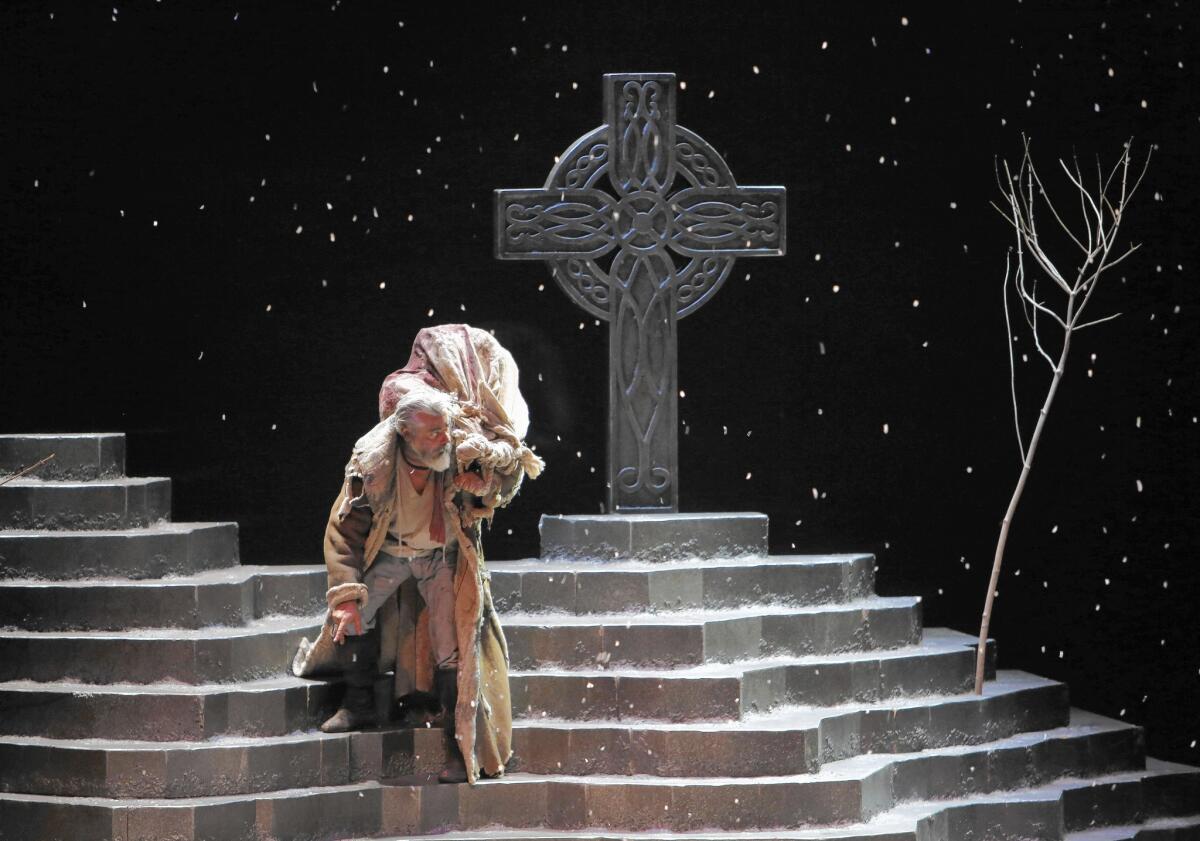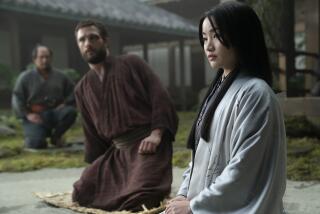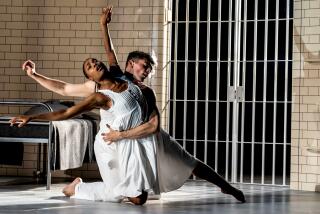Review: ‘Dunsinane’ at the Wallis held back trying to land big message

Of all the possible Shakespearean sequels, “Macbeth II” seems among the least likely.
At the end of Shakespeare’s tragedy, the tyrant’s head is lopped off, his childless wife has presumably killed herself and Malcolm, the worthy heir of slain Duncan, is hailed as king of Scotland.
Evil’s bloody joyride has come to an end, so what’s left to consider?
Plenty, according to Scottish playwright David Greig. His play “Dunsinane,” at the Wallis Annenberg Center for the Performing Arts in a coproduction of the National Theatre of Scotland and the Royal Shakespeare Company, imagines what happens when an English military force enters the country to impose its will on a fractured nation that can’t decide which faction should rule.
Sound familiar? Although Scotland is cold, damp and full of bogs and many of the characters speak in cumbersome brogues, there’s a hint in Roxana Silbert’s staging that the action could very well be taking place in the Middle East or Afghanistan.
Lady Macbeth — yes, reports of her death were premature — is attended to by women wearing head-scarves. But more to the point, the country’s discord is so deeply rooted that no outsider could ever marshal enough troops to sort out an internal quagmire in desperate need of, to use the cliché of the Sunday morning talk shows, “a political solution.”
The relevance of “Dunsinane” is both its international touring calling card and its playwriting liability. This is a work that very much wants to illustrate the lesson that Afghanistan and Iraq have been teaching us for more than a decade — that occupiers, even with the best of democratic intentions, are doomed to failure when civil dissension and unrest are the facts on the ground.
If Greig’s drama were more fully imagined, this idea might have a more powerful effect. “Dunsinane” is intelligently arranged, but the characters are more or less figures in a diagram that is drawn independent of them. Their motivations, conflicts and moments of ambivalence matter less than the play’s Big Point.
No wonder the name “Macbeth” is avoided. Next to such a bubbling cauldron of dramatic poetry, “Dunsinane” seems a docile stir-fry. Greig mixes in plenty of laddish humor and topical irony to his tale, but one indication of the work’s lyrical shortfall is the way snow is employed in a climactic scene to compensate for what the writing is unable to supply — deadly foreboding.
Much of the first half of the play is spent trying to establish an alternative version to Shakespeare’s famous tragedy. This makes for some rough sledding. Lady Macbeth, here known as Gruach (Siobhan Redmond), is not only alive but she has a son, whom she insists is the king. (All right, let’s try to play along.)
Malcolm (Ewan Donald), an equivocating and rather disaffectingly effete ruler, doesn’t yet have the allegiance of all the clan chieftains. He also doesn’t have much patience for Siward (Darrell D’Silva), a commanding though not very subtle English general who has come to Dunsinane to back Malcolm’s legitimacy to the throne with force.
After learning that Gruach and her son will be a source of dissent (the boy isn’t Macbeth’s, and Gruach’s family has its own claim), Siward must decide whether to put her head on a pike or attempt to make nice with warriors holding ancient grudges. An idealist, he decides, “Malcolm will make a new situation where everybody works together in pursuit of the kingdom’s common interest.”
Stalwart as ever Macduff (Keith Fleming), a better judge of the Scottish predicament, replies, “To create that situation would require a very large army, and it would take a very long time.” The more involving second half of the play is devoted to demonstrating the bloody truth of this torn-from-the-headlines observation.
Greig, in a nod perhaps to the Macbeths’ infamously lusty union, adds a romantic wrinkle. Siward becomes infatuated with Gruach, whose scheming nature apparently still has its seductive side for battle-hardened men. Their relationship, though not all that convincing dramatically, is boldly enacted by the leads, who are as stirring as they can be given the limited range and textures of their roles. (The production, which includes accompaniment from an onstage band performing Nick Powell’s rock-ish compositions, is smoothly executed.)
I must admit that it felt slightly odd to encounter “Dunsinane” at the Wallis, an institution still trying to figure out its artistic mission. Shakespeare and political drama haven’t been integral to the programming, and so coming upon this Greig import in Beverly Hills was a bit like stumbling across a lawn mower at Prada.
But let’s not look askance at well-intentioned work that has something to say and that will appeal to audiences eager to uncover connections between the evening news and the dramatic stage.
-------------------------
‘Dunsinane’
Where: Wallis Annenberg Center for the Performing Arts, 9390 N. Santa Monica Blvd, Beverly Hills
When: 8 p.m. Tuesday-Friday, 3 and 8 p.m. Saturday, 2 and 7 p.m. Sunday. Ends Sunday.
Tickets: $39-$110
Info: (310) 746-4000, https://www.TheWallis.org
Running time: 2 hours, 30 minutes
More to Read
The biggest entertainment stories
Get our big stories about Hollywood, film, television, music, arts, culture and more right in your inbox as soon as they publish.
You may occasionally receive promotional content from the Los Angeles Times.







